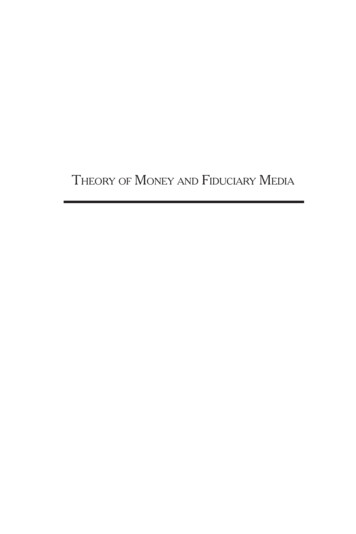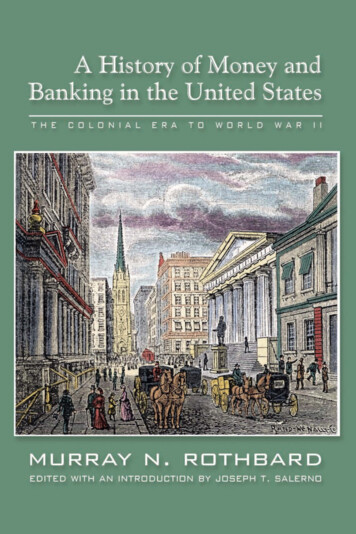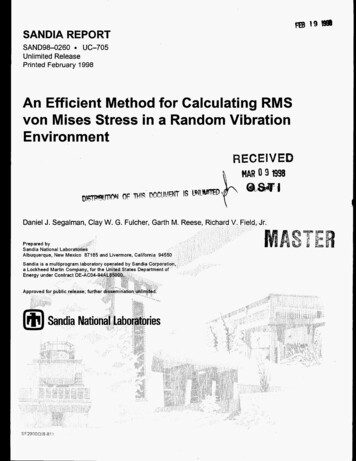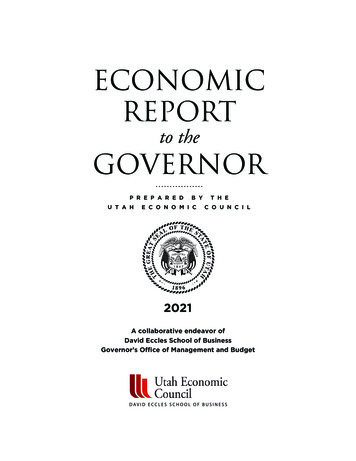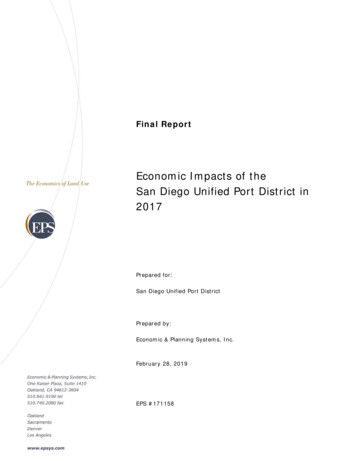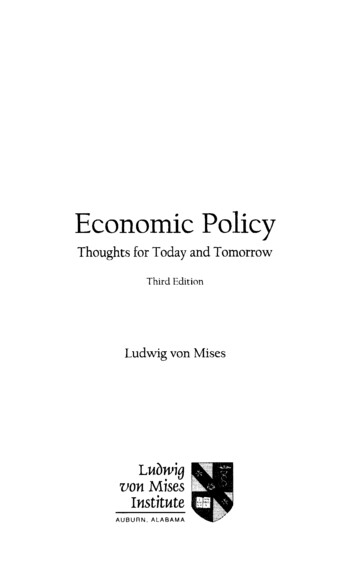
Transcription
Economic PolicyThoughts for Today and TomorrowThird EditionLudwig von Misesvon MisesInstituteAUBURN,ALABAMA
Originally published 1979 by Regnery/Gateway, Inc., Chicago(ISBN 0-89526-899-X). Copyright by Margit von Mises.Second edition copyright 1995 by Bettina Bien Greaves.Third edition copyright 2006 by Bettina Bien Greaves.All rights reserved. No part of this book may be reproduced inany manner whatsoever without written permission except inthe case of reprints in the context of reviews. For informationwrite the Ludwig von Mises Institute, 518 West MagnoliaAvenue, Auburn, Alabama 36832.ISBN 13: 978-1-933550-01-5ISBN 10: 1-933550-01-5
ContentsIntroduction by Bettina Bien GreavesviiForeword by Margit von Misesxiii1st LectureCapitalism12nd LectureSocialism173rd LectureInterventionism374th LectureInflation555th LectureForeign Investment756th LecturePolicies and Ideas93Index107
IntroductionThe ideal economic policy, both for today and tomorrow, is very simple. Government should protect and defend against domestic and foreign aggression the livesand property of the persons under its jurisdiction, settledisputes that arise, and leave the people otherwise freeto pursue their various goals and ends in life. This is aradical idea in our interventionist age. Governments today are often asked to regulate and control production,to raise the prices of some goods and services and tolower the prices of others, to fix wages, to help somebusinesses get started and to keep others from failing,to encourage or hamper imports and exports, to care forthe sick and the elderly, to support the profligate, andso on and on and on.Ideally government should be a sort of caretaker, notof the people themselves, but of the conditions whichwill allow individuals, producers, traders, workers, entrepreneurs, savers, and consumers to pursue their owngoals in peace. If government does that, and no more,the people will be able to provide for themselves muchbetter than the government possibly could. This in essence is the message of Professor Ludwig von Mises inthis small volume.Professor Mises (1881-1973) was one of the 20th cenvu
viiiECONOMIC POLICYtury's foremost economists. He was the author of profound theoretical books such a Human Action, Socialism,Theory and History, and a dozen other works. However,in these lectures, delivered in Argentina in 1959, hespoke in nontechnical terms suitable for his audience ofbusiness professionals, professors, teachers, and students. He illustrates theory with homespun examples.He explains simple truths of history in terms of economic principles. He describes how capitalism destroyedthe hierarchical order of European feudalism, and discusses the political consequences of various kinds ofgovernment. He analyzes the failures of socialism andthe welfare state and shows what consumers and workers can accomplish when they are free under capitalismto determine their own destinies.When government protects the rights of individualsto do as they wish, so long as they do not infringe on theequal freedom of others to do the same, they will dowhat comes naturally—work, cooperate, and trade withone another. They will then have the incentive to save,accumulate capital, innovate, experiment, take advantage of opportunities, and produce. Under these conditions, capitalism will develop. The remarkable economicimprovements of the 18th and 19th centuries and Germany's post-World War II "economic miracle" were due,as Professor Mises explains, to capitalism:[I]n economic policies, there are no miracles. You have read inmany newspapers and speeches, about the so-called Germaneconomic miracle—the recovery of Germany after its defeatand destruction in the Second World War. But this was nomiracle. It was the application of the principles of the free marketeconomy, of the methods of capitalism, even though they werenot applied completely in all respects. Every country can experience the same "miracle" of economic recovery, although I
Introductionixmust insist that economic recovery does not come from a miracle; it comes from the adoption of—and is the result of—soundeconomic policies, (p. 15)So we see that the best economic policy is to limitgovernment to creating the conditions which permit individuals to pursue their own goals and live at peacewith their neighbors. Government's obligation is simplyto protect life and property and to allow people to enjoythe freedom and opportunity to cooperate and tradewith one another. In this way government creates theeconomic environment that permits capitalism to flourish:The development of capitalism consists in everyone's havingthe right to serve the customer better and /or more cheaply.And this method, this principle, has, within a comparativelyshort time, transformed the whole world. It has made possiblean unprecedented increase in world population, (p. 5)When government assumes authority and power to domore than this, and abuses that authority and power, asit has many times throughout history—notably in Germany under Hitler, in the U.S.S.R. under Stalin, and inArgentina under Peron—it hampers the capitalistic system and becomes destructive of human freedom.Dictator Juan Peron, elected President in 1946, was inexile when Mises visited Argentina in 1959, having beenforced out of the country in 1955. His wife, the popularEva, had died earlier, in 1952. Although Peron was outof the country, he had many supporters and was still aforce to be reckoned with. He returned to Argentina in1973, was again elected President and, with his new wifeIsabelita as Vice President, ruled until he died tenmonths later. His widow, Isabelita, then took over until
xECONOMIC POLICYher administration, charged with corruption, was finallyousted in 1976. Argentina has had a series of Presidentssince then and has made some strides toward improvingher economic situation. Life and property have been accorded greater respect, some nationalized industrieshave been sold to private buyers, and the inflation hasbeen slowed.The present work is a felicitous introduction to Mises'ideas. They are, of course, elaborated more fully in Human Action and his other scholarly works. Newcomersto his ideas would do well, however, to start with someof his simpler books such as Bureaucracy, or The AntiCapitalistic Mentality. With this background, readers willfind it easier to grasp the principles of the free marketand the economic theories of the Austrian school thatMises presents in his major works.BETTINA BIEN GREAVESFebruary 1995
IntroductionxiMises' Major Works(Date of first publication in parentheses)The Theory of Money and Credit (1912)Nation, State and Economy (1919)Socialism (1922)Liberalism (1927; 1st English translation titled,The Free and Prosperous Commonwealth)Critique of Interventionism (1929)Epistemological Problems of Economics (1933)Nationalokonomie (1940) Predecessor toHuman Action; no English translation.Bureaucracy (1944)Omnipotent Government (1944)Human Action (1949)Planning for Freedom (1952)The Anti-Capitalistic Mentality (1956)Theory and History (1957)The Ultimate Foundation of Economic Science (1962)Posthumous Publications:Notes and Recollections (1978)On the Manipulation of Money and Credit (1978)Economic Policy (1979)Money, Method, and the Market Process (1990)Economic Freedom and Interventionism (1990)Interventionism: An Economic Analysis (1998)
ForewordThe present book fully reflects tlie author's fundamental position for which he was—and still is—admired by followers andreviled by opponents. While each of tlw six lectures canstand alone as an independent essay, the harmony of the seriesgives an aesthetic pleasure similar to tltat derived from lookingat the architecture of a well-designed edifice.—Fritz MachlupPrinceton, 1979Late in 1958, when my husband was invited by Dr. Alberto Benegas-Lynch to come to Argentina and delivera series of lectures, I was asked to accompany him. Thisbook contains, in written word, what my husband saidto hundreds of Argentinian students in those lectures.We arrived in Argentina several years after Peron hadbeen forced to leave the country. He had governed destructively and completely destroyed Argentina's economic foundations. His successors were not much better.The nation was ready for new ideas, and my husbandwas equally ready to provide them.His lectures were delivered in English, in the enormous lecture hall of the University of Buenos Aires. Intwo neighboring rooms his words were simultaneouslytranslated into Spanish for students who listened withearphones. Ludwig von Mises spoke without any rexin
xivECONOMIC POLICYstraint about capitalism, socialism, interventionism, communism, fascism, economic policy and the dangers ofdictatorship. These young people, who listened to myhusband, did not know much about freedom of the market or individual freedom. As I wrote about this occasionin My Years with Ludzvig von Mises, "If anyone in thosetimes would have dared to attack communism and fascism as my husband did, the police would have come inand taken hold of him immediately, and the assemblywould have been broken up."The audience reacted as if a window had been openedand fresh air allowed to breeze through the rooms. Hespoke without any notes. As always, his thoughts wereguided by just a few words, written on a scrap of paper.He knew exactly what he wanted to say, and by usingcomparatively simple terms, he succeeded in communicating his ideas to an audience not familiar with hiswork, so that they could understand exactly what hewas saying.The lectures were taped, and the tapes were later transcribed by a Spanish-speaking secretary whose typedmanuscript I found among my husband's posthumouspapers. On reading the transcript, I remembered vividlythe singular enthusiasm with which those Argentinianshad responded to my husband's words. And it seemedto me, as a non-economist, that these lectures, deliveredto a lay audience in South America, were much easierto understand than many of Ludwig von Mises' moretheoretical writings. I felt they contained so much valuable material, so many thoughts important for today andthe future, that they should be made available to thepublic.Since my husband had never revised the transcriptsof his lectures for book publication, that task remained
Forewordxvfor me. I have been very careful to keep intact the meaning of every sentence, to change nothing of the contentand to preserve all the expressions my husband oftenused which are so familiar to his readers. My only contribution has been to pull the sentences together and takeout some of the little words one uses when talking informally. If my attempt to convert these lectures into a bookhas succeeded, it is only due to the fact that, with everysentence, I heard my husband's voice, I heard him talk.He was alive to me, alive in how clearly he demonstratedthe evil and danger of too much government; how comprehensibly and lucidly he described the differences between dictatorship and interventionism; with how muchwit he talked about important historic personalities; withhow few remarks he succeeded in making bygone timescome alive.I want to use this opportunity to thank my goodfriend George Koether for assisting me with this task.His editorial experience and his understanding of myhusband's theories were a great help to this book.I hope these lectures will be read not only by scholarsbut also by my husband's many admirers among noneconomists. And I earnestly hope that this book will bemade available to younger audiences, especially highschool and college students around the world.MARGIT VON MISESNew YorkJune 1979
1st LectureCapitalismDescriptive terms which people use are often quite misleading. In talking about modern captains of industryand leaders of big business, for instance, they call a mana "chocolate king" or a "cotton king" or an "automobileking." Their use of such terminology implies that theysee practically no difference between the modern headsof industry and those feudal kings, dukes or lords ofearlier days. But the difference is in fact very great, for achocolate king does not rule at all, he serves. He does notreign over conquered territory, independent of the market, independent of his customers. The chocolate king—or the steel king or the automobile king or any otherking of modern industry—depends on the industry heoperates and on the customers he serves. This "king"must stay in the good graces of his subjects, the consumers; he loses his "kingdom" as soon as he is no longer ina position to give his customers better service and provide it at lower cost than others with whom he mustcompete.Two hundred years ago, before the advent of capitalism, a man's social status was fixed from the beginningto the end of his life; he inherited it from his ancestors,and it never changed. If he was born poor, he alwaysremained poor, and if he was born rich—a lord or a
2ECONOMIC POLICYduke—he kept his dukedom and the property that wentwith it for the rest of his life.As for manufacturing, the primitive processing industries of those days existed almost exclusively for thebenefit of the wealthy. Most of the people (ninety percent or more of the European population) worked theland and did not come in contact with the city-orientedprocessing industries. This rigid system of feudal societyprevailed in the most developed areas of Europe formany hundreds of years.However, as the rural population expanded, there developed a surplus of people on the land. For this surplusof population without inherited land or estates, therewas not enough to do, nor was it possible for them towork in the processing industries; the kings of the citiesdenied them access. The numbers of these "outcasts"continued to grow, and still no one knew what to dowith them. They were, in the full sense of the word,"proletarians," outcasts whom the government couldonly put into the workhouse or the poorhouse. In somesections of Europe, especially in the Netherlands and inEngland, they became so numerous that, by the eighteenth century, they were a real menace to the preservation of the prevailing social system.Today, in discussing similar conditions in places likeIndia or other developing countries, we must not forgetthat, in eighteenth-century England, conditions weremuch worse. At that time, England had a population ofsix or seven million people, but of those six or sevenmillion people, more than one million, probably two million, were simply poor outcasts for whom the existingsocial system made no provision. What to do with theseoutcasts was one of the great problems of eighteenthcentury England.
Capitalism3Another great problem was the lack of raw materials.The British, very seriously, had to ask themselves thisquestion: what are we going to do in the future, whenour forests will no longer give us the wood we need forour industries and for heating our houses? For the rulingclasses it was a desperate situation. The statesmen didnot know what to do, and the ruling gentry were absolutely without any ideas on how to improve conditions.Out of this serious social situation emerged the beginnings of modern capitalism. There were some personsamong those outcasts, among those poor people, whotried to organize others to set up small shops whichcould produce something. This was an innovation. Theseinnovators did not produce expensive goods suitableonly for the upper classes; they produced cheaper products for everyone's needs. And this was the origin ofcapitalism as it operates today. It was the beginning ofmass production, the fundamental principle of capitalisticindustry. Whereas the old processing industries servingthe rich people in the cities had existed almost exclusively for the demands of the upper classes, the newcapitalist industries began to produce things that couldbe purchased by the general population. It was massproduction to satisfy the needs of the masses.This is the fundamental principle of capitalism as itexists today in all of those countries in which there is ahighly developed system of mass production: Big business, the target of the most fanatic attacks by the socalled leftists, produces almost exclusively to satisfy thewants of the masses. Enterprises producing luxurygoods solely for the well-to-do can never attain the magnitude of big businesses. And today, it is the people whowork in large factories who are the main consumers ofthe products made in those factories. This is the funda-
4ECONOMIC POLICYmental difference between the capitalistic principles ofproduction and the feudalistic principles of the preceding ages.When people assume, or claim, that there is a difference between the producers and the consumers of theproducts of big businesses, they are badly mistaken. InAmerican department stores you hear the slogan, "thecustomer is always right." And this customer is the sameman who produces in the factory those things which aresold in the department stores. The people who think thatthe power of big business is enormous are mistaken also,since big business depends entirely on the patronage ofthose who buy its products: the biggest enterprise losesits power and its influence when it loses its customers.Fifty or sixty years ago it was said in almost all capitalist countries that the railroad companies were too bigand too powerful; they had a monopoly; it was impossible to compete with them. It was alleged that, in thefield of transportation, capitalism had already reached astage at which it had destroyed itself, for it had eliminated competition. What people overlooked was the factthat the power of the railroads depended on their abilityto serve people better than any other method of transportation. Of course it would have been ridiculous tocompete with one of these big railroad companies bybuilding another railroad parallel to the old line, sincethe old line was sufficient to serve existing needs. Butvery soon there came other competitors. Freedom ofcompetition does not mean that you can succeed simplyby imitating or copying precisely what someone else hasdone. Freedom of the press does not mean that you havethe right to copy what another man has written and thusto acquire the success which this other man has dulymerited on account of his achievements. It means that
Capitalism5you have the right to write something different. Freedomof competition concerning railroads, for example, meansthat you are free to invent something, to do something,which will challenge the railroads and place them in avery precarious competitive situation.In the United States the competition to the railroads—in the form of buses, automobiles, trucks, and airplanes—has caused the railroads to suffer and to be almost completely defeated, as far as passenger transportation is concerned.The development of capitalism consists in everyone'shaving the right to serve the customer better and /ormore cheaply. And this method, this principle, has,within a comparatively short time, transformed thewhole world. It has made possible an unprecedentedincrease in world population.In eighteenth-century England, the land could support only six million people at a very low standard ofliving. Today more than fifty million people enjoy amuch higher standard of living than even the rich enjoyed during the eighteenth-century. And today's standard of living in England would probably be still higher,had not a great deal of the energy of the British beenwasted in what were, from various points of view,avoidable political and military "adventures."These are the facts about capitalism. Thus, if an Englishman—or, for that matter, any other man in any country of the world—says today to his friends that he isopposed to capitalism, there is a wonderful way to answer him: "You know that the population of this planetis now ten times greater than it was in the ages precedingcapitalism; you know that all men today enjoy a higherstandard of living than your ancestors did before the ageof capitalism. But how do you know that you are the one
6ECONOMIC POLICYout of ten who would have lived in the absence of capitalism? The mere fact that you are living today is proofthat capitalism has succeeded, whether or not you consider your own life very valuable."In spite of all its benefits, capitalism has been furiouslyattacked and criticized. It is necessary that we understand the origin of this antipathy. It is a fact that thehatred of capitalism originated not with the masses, notamong the workers themselves, but among the landedaristocracy—the gentry, the nobility, of England and theEuropean continent. They blamed capitalism for something that was not very pleasant for them: at the beginning of the nineteenth century, the higher wages paidby industry to its workers forced the landed gentry topay equally higher wages to their agricultural workers.The aristocracy attacked the industries by criticising thestandard of living of the masses of the workers.Of course—from our viewpoint, the workers' standard of living was extremely low; conditions under earlycapitalism were absolutely shocking, but not because thenewly developed capitalistic industries had harmed theworkers. The people hired to work in factories had already been existing at a virtually subhuman level.The famous old story, repeated hundreds of times,that the factories employed women and children andthat these women and children, before they were working in factories, had lived under satisfactory conditions,is one of the greatest falsehoods of history. The motherswho worked in the factories had nothing to cook with;they did not leave their homes and their kitchens to gointo the factories, they went into factories because theyhad no kitchens, and if they had a kitchen they had nofood to cook in those kitchens. And the children did notcome from comfortable nurseries. They were starving
Capitalism7and dying. And all the talk about the so-called unspeakable horror of early capitalism can be refuted by a singlestatistic: precisely in these years in which British capitalism developed, precisely in the age called the IndustrialRevolution in England, in the years from 1760 to 1830,precisely in those years the population of England doubled, which means that hundreds or thousands of children—who would have died in preceding times—survived and grew to become men and women.There is no doubt that the conditions of the precedingtimes were very unsatisfactory. It was capitalist businessthat improved them. It was precisely those early factories that provided for the needs of their workers, eitherdirectly or indirectly by exporting products and importing food and raw materials from other countries. Againand again, the early historians of capitalism have—onecan hardly use a milder word—falsified history.One anecdote they used to tell, quite possibly invented, involved Benjamin Franklin. According to thestory, Ben Franklin visited a cotton mill in England, andthe owner of the mill told him, full of pride: "Look, hereare cotton goods for Hungary." Benjamin Franklin, looking around, seeing that the workers were shabbilydressed, said: "Why don't you produce also for yourown workers?"But those exports of which the owner of the mill spokereally meant that he did produce for his own workers,because England had to import all its raw materials.There was no cotton either in England or in continentalEurope. There was a shortage of food in England, andfood had to be imported from Poland, from Russia, fromHungary. These exports were the payment for the imports of the food which made the survival of the Britishpopulation possible. Many examples from the history of
8ECONOMIC POLICYthose ages will show the attitude of the gentry and aristocracy toward the workers. I want to cite only two examples. One is the famous British "Speenhamland" system. By this system, the British government paid allworkers who did not get the minimum wage (determined by the government) the difference between thewages they received and this minimum wage. This savedthe landed aristocracy the trouble of paying higherwages. The gentry would pay the traditionally low agricultural wage, and the government would supplementit, thus keeping workers from leaving rural occupationsto seek urban factory employment.Eighty years later, after capitalism's expansion fromEngland to continental Europe, the landed aristocracyagain reacted against the new production system. InGermany the Prussian Junkers, having lost many workers to the higher-paying capitalistic industries, inventeda special term for the problem: "flight from the countryside"—Landflucht. And in the German Parliament, theydiscussed what might be done against this evil, as it wasseen from the point of view of the landed aristocracy.Prince Bismarck, the famous chancellor of the GermanReich, in a speech one day said, "I met a man in Berlinwho once had worked on my estate, and I asked this man,'Why did you leave the estate; why did you go away fromthe country; why are you now living in Berlin?'" And,according to Bismarck, this man answered, "You don'thave such a nice Biergarten in the village as we have herein Berlin, where you can sit, drink beer, and listen tomusic." This is, of course, a story told from the point ofview of Prince Bismarck, the employer. It was not thepoint of view of all his employees. They went into industry because industry paid them higher wages and raisedtheir standard of living to an unprecedented degree.
Capitalism9Today, in the capitalist countries, there is relativelylittle difference between the basic life of the so-calledhigher and lower classes; both have food, clothing,and shelter. But in the eighteenth century and earlier,the difference between the man of the middle class andthe man of the lower class was that the man of themiddle class had shoes and the man of the lower classdid not have shoes. In the United States today thedifference between a rich man and a poor man meansvery often only the difference between a Cadillac and aChevrolet. The Chevrolet may be bought secondhand,but basically it renders the same services to its owner:he, too, can drive from one point to another. Morethan fifty percent of the people in the United Statesare living in houses and apartments they own themselves.The attacks against capitalism—especially with respect to the higher wage rates—start from the false assumption that wages are ultimately paid by people whoare different from those who are employed in the factories. Now it is all right for economists and for studentsof economic theories to distinguish between the workerand the consumer and to make a distinction betweenthem. But the fact is that every consumer must, in someway or the other, earn the money he spends, and theimmense majority of the consumers are precisely thesame people who work as employees in the enterprisesthat produce the things which they consume. Wage ratesunder capitalism are not set by a class of people differentfrom the class of people who earn the wages; they arethe same people. It is not the Hollywood film corporationthat pays the wages of a movie star; it is the people whopay admission to the movies. And it is not the entrepreneur of a boxing match who pays the enormous de-
10ECONOMIC POLICYmands of the prize fighters; it is the people who payadmission to the fight. Through the distinction betweenthe employer and the employee, a distinction is drawnin economic theory, but it is not a distinction in real life;here, the employer and the employee ultimately are oneand the same person.There are people in many countries who consider itvery unjust that a man who has to support a family withseveral children will receive the same salary as a manwho has only himself to take care of. But the question isnot whether the employer should bear greater responsibility for the size of a worker's family.The question we must ask in this case is: Are you, asan individual, prepared to pay more for something, letus say, a loaf of bread, if you are told that the man whoproduced this loaf of bread has six children? The honestman will certainly answer in the negative and say, "Inprinciple I would, but in fact if it costs less I would ratherbuy the bread produced by a man without any children/'The fact is that, if the buyers do not pay the employerenough to enable him to pay his workers, it becomesimpossible for the employer to remain in business.The capitalist system was termed "capitalism" not bya friend of the system, but by an individual who considered it to be the worst of all historical systems, the greatest evil that had ever befallen mankind. That man wasKarl Marx. Nevertheless, there is no reason to rejectMarx's term, because it describes clearly the source ofthe great social improvements brought about by capitalism. Those improvements are the result of capital accumulation; they are based on the fact that people, as arule, do not consume everything they have produced,that they save—and invest—a part of it. There is a greatdeal of misunderstanding about this problem and—in
Capitalism11the course of these lectures—I will have the opportunityto deal with the most fundamental misapprehensionswhich people have concerning the accumulation of capital, the use of capital, and the universal advantages tobe gained from such use. I will deal with capitalism particularly in my lectures about foreign investment andabout that most critical problem of present-day politics,inflation. You know, of course, that inflation exists notonly in this country. It is a problem all over the worldtoday.An often unrealized fact about capitalism is this: savings mean benefits for all those who are anxious to produce or to earn wages. When a man has accrued a certainamount of money—let us say, one thousand dollars—and, instead of spending it, entrusts these dollars to asavings bank or an insurance company, the money
The remarkable economic improvements of the 18th and 19th centuries and Ger-many's post-World War II "economic miracle" were due, as Professor Mises explains, to capitalism: [I]n economic policies, there are no miracles. You have read in many newspapers and speeches, about the so-called German economic miracle—the recovery of Germany after .

